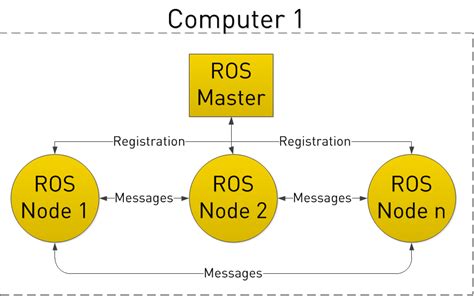The field of Robotics Operating System (ROS) technology has been rapidly expanding in recent years, with a growing number of applications in industries such as robotics, autonomous vehicles, and IoT. As a result, the demand for skilled professionals with expertise in ROS has increased, making it an attractive career path for many. However, mastering ROS technology requires a combination of theoretical knowledge, practical skills, and hands-on experience. In this article, we will explore five ways to master ROS technology and stay ahead in the field.
Understanding the Basics of ROS

Before diving into advanced topics, it's essential to have a solid understanding of the basics of ROS. This includes familiarity with the ROS framework, its components, and the various tools and libraries available. Some key concepts to grasp include nodes, topics, messages, services, and parameters. Additionally, understanding the different ROS distributions, such as ROS Melodic and ROS Noetic, and their respective features and compatibility is crucial.
Learning Resources for ROS Basics
- ROS Official Tutorials: The official ROS tutorials are an excellent starting point for beginners, covering topics such as installing ROS, creating nodes, and understanding the ROS ecosystem.
- ROS Wiki: The ROS Wiki is a comprehensive resource that provides detailed documentation on ROS concepts, tools, and libraries.
- Online Courses: Websites such as Udemy, Coursera, and edX offer a range of courses on ROS, from introductory to advanced levels.
Practical Experience with ROS Projects

Hands-on experience is essential for mastering ROS technology. Working on projects that involve designing, implementing, and testing ROS-based systems helps develop practical skills and reinforces theoretical knowledge. Some project ideas include:
- Building a robot using ROS and a single-board computer such as the Raspberry Pi
- Creating a ROS-based autonomous vehicle using a simulation environment such as Gazebo
- Developing a ROS-powered IoT system for monitoring and controlling environmental parameters
ROS Project Resources
- ROS Projects on GitHub: GitHub hosts a vast collection of open-source ROS projects, ranging from simple examples to complex systems.
- ROS Tutorials and Examples: The ROS tutorials and examples provided on the official ROS website offer a range of projects to get started with.
- ROS Books: Books such as "ROS Robotics Projects" and "Learning ROS for Robotics Programming" provide comprehensive guides to building ROS-based projects.
Staying Up-to-Date with the Latest ROS Developments

The ROS community is actively engaged in developing and improving the technology, with new features, tools, and libraries being released regularly. To stay ahead in the field, it's essential to stay informed about the latest developments and advancements. Some ways to do this include:
- Following ROS blogs and news sites, such as the ROS Blog and ROS News
- Participating in ROS forums and discussion groups, such as the ROS Discourse forum
- Attending ROS conferences and meetups, such as the annual ROSCon conference
ROS Community Resources
- ROS Blog: The official ROS blog provides updates on the latest ROS developments, new features, and community news.
- ROS Discourse Forum: The ROS Discourse forum is an active community discussion platform for ROS users, developers, and enthusiasts.
- ROSCon Conference: The annual ROSCon conference brings together ROS developers, users, and researchers to share knowledge and showcase the latest advancements in ROS technology.
Collaborating with Other ROS Enthusiasts

Collaborating with other ROS enthusiasts is an excellent way to learn from others, share knowledge, and gain new insights into ROS technology. Some ways to collaborate include:
- Participating in open-source ROS projects on GitHub or other platforms
- Joining ROS-related groups on social media platforms, such as LinkedIn or Facebook
- Attending ROS meetups and conferences to network with other ROS enthusiasts
ROS Collaboration Resources
- ROS GitHub: GitHub hosts a vast collection of open-source ROS projects, providing opportunities for collaboration and contribution.
- ROS Groups on LinkedIn: LinkedIn groups such as the ROS Users Group and ROS Developers Group provide a platform for discussion and collaboration.
- ROS Meetups: Meetup.com hosts a range of ROS meetups and events, providing opportunities for in-person collaboration and networking.
Advanced ROS Topics and Specialization

Once you have a solid foundation in ROS basics and practical experience with ROS projects, it's time to explore advanced topics and specialize in specific areas. Some advanced ROS topics include:
- ROS2: The next-generation ROS framework, providing improved performance, scalability, and security.
- ROS-I: The ROS-Industrial (ROS-I) project, focusing on the application of ROS in industrial robotics and automation.
- ROS and AI: The integration of ROS with artificial intelligence (AI) and machine learning (ML) techniques, enabling advanced robotic capabilities.
Advanced ROS Resources
- ROS2 Documentation: The official ROS2 documentation provides comprehensive information on the ROS2 framework, its features, and its applications.
- ROS-I Website: The ROS-I website provides information on the ROS-I project, its goals, and its achievements.
- ROS and AI Courses: Online courses such as "ROS and AI" and "ROS and ML" provide a comprehensive introduction to the integration of ROS with AI and ML techniques.






What is ROS?
+ROS (Robot Operating System) is an open-source software framework that provides a set of tools and libraries for building robot applications.
What are the benefits of using ROS?
+The benefits of using ROS include its open-source nature, large community support, and the ability to develop complex robotic applications quickly and efficiently.
What is the difference between ROS and ROS2?
+ROS2 is the next-generation ROS framework, providing improved performance, scalability, and security compared to the original ROS framework.
By following these five ways to master ROS technology, you can stay ahead in the field, develop practical skills, and contribute to the growing community of ROS enthusiasts. Remember to stay up-to-date with the latest developments, collaborate with others, and explore advanced topics to specialize in specific areas. With dedication and persistence, you can become a proficient ROS developer and make a significant impact in the world of robotics and automation.
